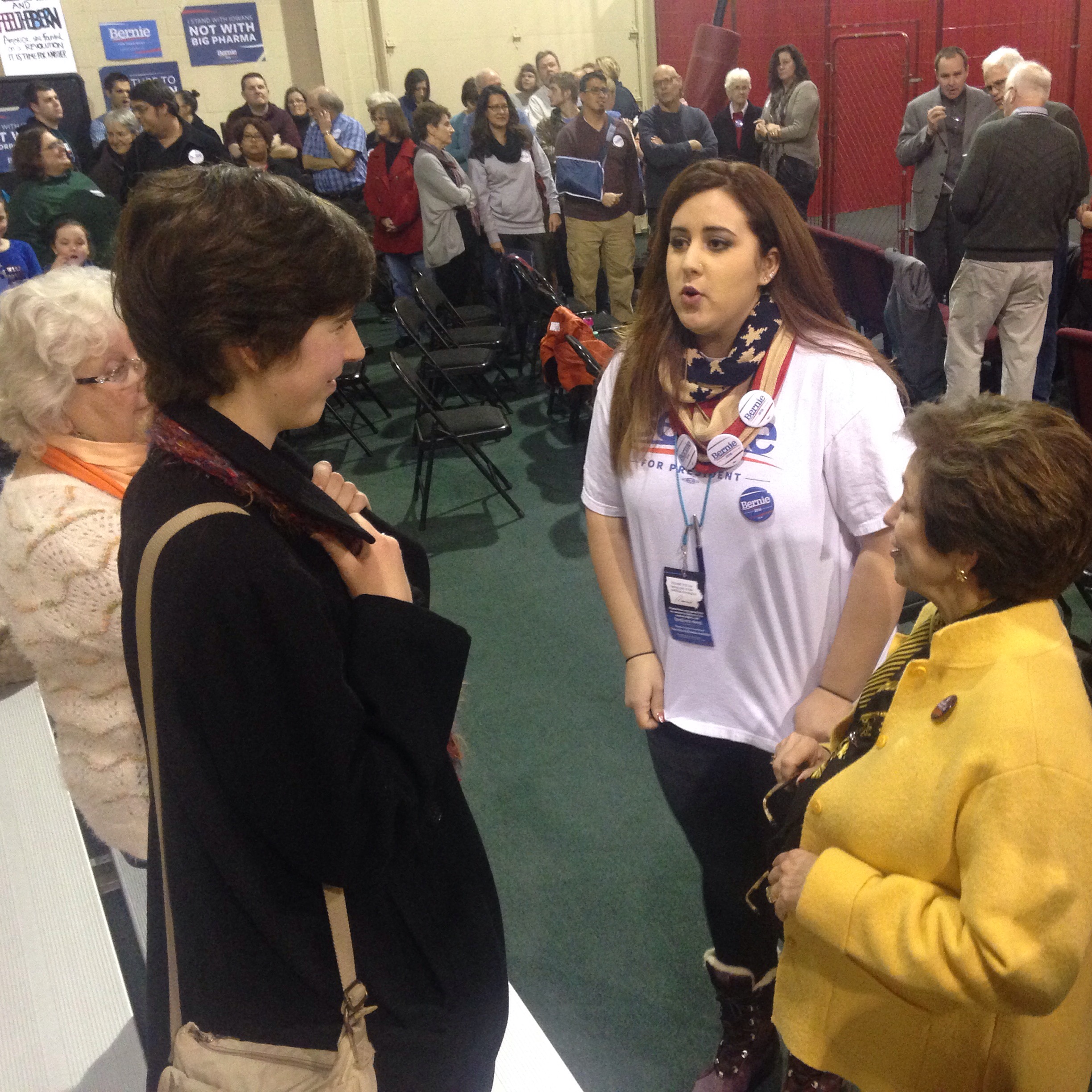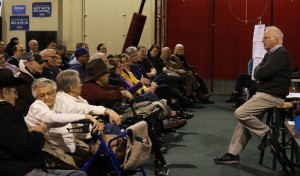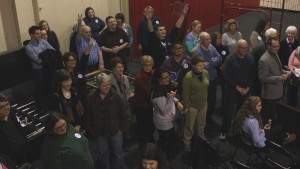
The Iowa Democratic caucuses attracted many first-time caucus-goers, young and old — but not enough to break the turnout record set eight years ago nor to propel Bernie Sanders to victory.
Hillary Clinton claimed a narrow victory over Sanders in terms of percentage of the vote won, with a 0.2 percent margin between them Clinton will send 23 delegates to the Democratic national convention compared to Sanders’ 21.
The power of first-time caucus-goers was predicted to benefit Sanders in particular. CBS News reported before the caucuses began that among voters who would be caucusing for the first time, Sanders held a 62 to 35 percent lead over Hillary Clinton, but among Democrats who previously attended the caucuses, Clinton led Sanders 52 to 41 percent. Barack Obama turned out record numbers of young caucus-goers in 2008 on his way to a victory, and many in the media predicted that if Sanders could do the same, he would be likely to win.
As it turned out, about 42 percent of Democratic caucus-goers on Monday were first-timers, compared to 57 percent eight years ago. NPR reports that just 18 percent of caucus-goers were aged 17 to 29, a key demographic for Sanders, but the Vermont senator claimed 84 percent of the vote from that demographic.

Young First-timers
Many of the first time caucus-goers at the 112th precinct caucus in West Des Moines were there to support Sanders. In fact, for college students Rose Rivas and Logan Bell, it was not only their first time caucusing, but also their first time as precinct captains for the Sanders campaign.
As volunteers with the campaign, Rivas and Bell say they decided to take on this responsibility, which involves making sure people are in the designated caucus area for Sanders when it comes time to tally up each candidate’s support and essentially leading the Sanders’ supporters.
Rivas says it was overwhelming to not only be caucusing for the first time but to be a precinct captain as well, especially because more Democrats than she expected came to the precinct caucus. To prepare for the role of precinct captain, she says she and Bell watched training videos on YouTube.
Rivas and Bell say they support Sanders because of his stance on a number of issues, including healthcare and higher education.
Like Rivas and Bell, many of the first time caucus-goers are college-aged Democrats who were too young to caucus in 2008. Many of these young Iowans came to caucus for Sanders, including high school student Sarah Wheeler. She says she was excited to caucus for the first time and considered painting her face to say “Feel the Bern.”
“He’s just a cute little old man who wants to change the world,” Wheeler says. “I think we should let him.”
Wheeler says she has been planning for a long time to caucus, and many of her friends are doing the same.

Other first time caucus-goers were there to support Martin O’Malley. The Democratic caucus process requires that a candidate have at least 15 percent support within a caucus in order to be “viable” — if fewer than 15 percent of caucus-goers support a candidate, then those caucus-goers must join another group or remain with their candidate and forfeit their say in the final tally. Since O’Malley did not have viability at this precinct, these supporters had to join Clinton or Sanders or their vote would not count. One of these Iowans, recent college graduate Sarah MacBirde, decided to caucus for Sanders after previously remaining in the O’Malley group.
MacBirdie says she already knew what to expect from the caucus because she attended in 2008, even though she was not old enough to participate. However, she says she was surprised no one spoke on behalf of the candidates at the beginning of the caucus. Instead, people tried to convince others to join their candidate’s group during the caucus.
MacBirdie says she is happy she participated in the caucus and plans to participate again in the future.
“I’m of the opinion, if you don’t participate, you don’t get to complain,” MacBirdie says. “People always say, ‘My vote doesn’t matter.’ The reason it doesn’t matter is because you don’t vote. If enough people get out there and do it, it does make a difference, and I want to be able to try to make a difference if I can.”
Other First-timers
Not all of the first time caucus-goers at the 112th precinct caucus were young voters.
Stay-at-home mom Mera Logsdon, 35, caucused for the first time and brought her seven- and ten-year-old daughters along.
“I just felt like it matters, and it needs to be done, and we need to be there to make a difference,” Logsdon says. “If everybody made a difference, what could we do? We could do a lot. So here we are.”
Logsdon says she has supported Sanders since he announced he was running for presidency but only decided to caucus for him about a month ago because the polls placed him and Clinton neck-in-neck.
After the 112th precinct caucus ended, Logsdon says she enjoyed it and will definitely caucus again in the future.
“It’s been a great time,” Logsdon says. “It’s exciting. It’s as fun as you make it, and the people here seem to make it a pretty good time. Everyone’s going with the flow and enjoying themselves.”
Helen Brown, 84, attended the 112th precinct caucus in West Des Moines for the first time Monday. Helen says before the caucus, she was planning to caucus for Clinton, but she was not sure. She says she hopes hoped citizens would make their case for their candidates to her. She says she lived in Texas for several years, and before that lived in Iowa but never attended the caucuses.
Helen’s son, Richard Brown, was also attending the caucus for the first time. He says he supported Barack Obama in the last election and was drawn out to the Democratic caucuses this year by the field of Republicans.
“I just think their rhetoric is way overboard,” Richard says. “They all scare me.”
Richard said going into the caucus he understood pretty well how the caucus process was going to work, thanks to explanations on television and newspapers.
“For once I thought I ought to caucus and see what it’s all about,” Richard says. “I want to have good feedback from everybody here.”
